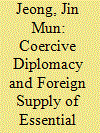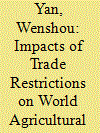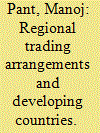| Srl | Item |
| 1 |
ID:
182558


|
|
|
|
|
| Summary/Abstract |
Economic sanctions constrain targets’ capacity to maintain essential goods imports from foreign suppliers. This research points out that target states may respond to this adverse effect of sanctions by redirecting the resources invested to secondary goods imports to essential goods imports. In addition, I suggest that the availability of this strategy significantly varies across sanctions instruments. When facing foreign aid sanctions, targets may be able to effectively reallocate their import funding to sustain foreign supply of essential items. However, when they are subject to trade sanctions, such a response is not readily available. In the data analysis with 150 countries from 1974 to 2006, I utilize foodstuffs as a proxy of essential goods and provide evidence that targets under foreign aid sanctions transfer their import funding to maintain adequate amount of food aid. Yet, I find no evidence that targets subject to trade sanctions also respond with the same manner.
|
|
|
|
|
|
|
|
|
|
|
|
|
|
|
|
| 2 |
ID:
182583


|
|
|
|
|
| Summary/Abstract |
During the COVID-19 pandemic, countries applied trade restrictions to insulate their domestic markets from the world market. However, these trade policies could have amplified international market price fluctuations. This paper explores the effects of trade restrictions on international agricultural price volatility. A theoretical model is developed to quantify how trade policies amplify the initial shock. Using panel data covering 71 countries from January 2020 to July 2021, we examine empirically the effects of trade policies on world agricultural price volatility. The results show that trade distortions further induced volatility of world agricultural prices by around 22 percent during the COVID-19 pandemic. The multiplier effects are much more substantial in agricultural exporting countries than in importing countries. Large countries like China and the US could make significant contributions to stabilizing world prices by limiting the extent of unilateral trade policy interventions.
|
|
|
|
|
|
|
|
|
|
|
|
|
|
|
|
| 3 |
ID:
113251


|
|
|
|
|
| Publication |
2010.
|
| Summary/Abstract |
One of the remarkable features of international trade has been the explosion of regional trading arrangements (RTAs) especially after 1990. In particular, developing countries have been in the forefront in contracting RTAs, especially among themselves. The period after 1995 is also characterized by the growth of trade among developing countries while their trade with developed countries has been on the decline. It seems that the latter phenomenon is driven by RTAs. India too has been very active in recent years in contracting RTAs. This article argues that the causality seems to be from trade to RTAs rather than the other way round. It is seen that conventional gains from RTAs via tariff reduction do not show up in empirical work. RTAs thus do not lead to increased trade among countries and are, in fact, a de facto rationalization of growing trade relations between countries. It is argued further that the growth in RTAs is explained more by developments in international politics and the emergence of a multi-polar world rather than by the conventional calculus of economic theory.
|
|
|
|
|
|
|
|
|
|
|
|
|
|
|
|